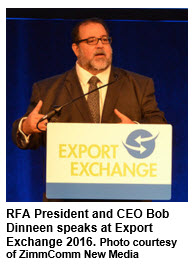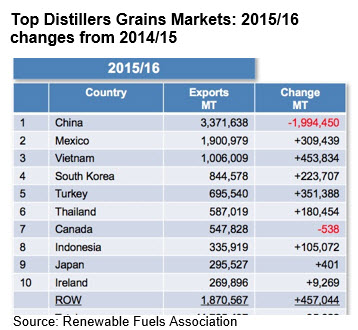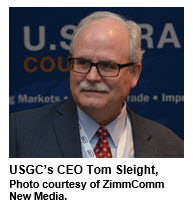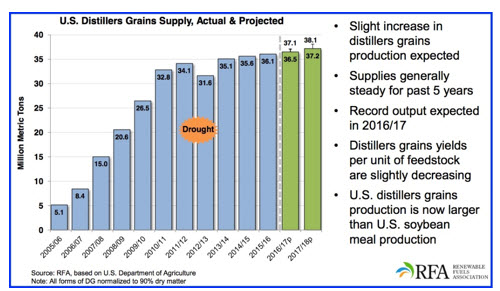WASHINGTON, Oct. 27, 2016 - The ethanol industry is watching closely as more than 200 foreign grain buyers from more than 35 countries are in Detroit this week for Export Exchange 2016. Significantly, the buyers at the conference include two teams from China despite the Asian nation’s bombshell rulings that threaten to choke off distillers’ dried grains (DDGS) exports to China by imposing stiff anti-subsidy and anti-dumping duties.
China’s new trade barriers are a major concern because the
country has been by far the leading DDGS market for the U.S. and because
exporting distillers’ grain, a co-product of ethanol production, is essential
for U.S. ethanol industry profitability. The result: It’s more important than
ever that the ExEx conference succeed in expanding other DDGS markets quickly
to offset the loss of sales to China. Adding to the pressure, Vietnam, the
third largest buyer of U.S. distillers’ grains, is also threatening new
restrictions on DDGS imports from the U.S.
production, is essential
for U.S. ethanol industry profitability. The result: It’s more important than
ever that the ExEx conference succeed in expanding other DDGS markets quickly
to offset the loss of sales to China. Adding to the pressure, Vietnam, the
third largest buyer of U.S. distillers’ grains, is also threatening new
restrictions on DDGS imports from the U.S.
Co-sponsored by the Renewable Fuels Association (RFA) and the U.S. Grains Council (USGC), this third biennial ExEx conference provides buyer/seller networking and presentations delivering the message that the U.S. will remain the world’s most reliable supplier regardless of whether Donald Trump or Hillary Clinton wins the presidential election two weeks from now.
RFA President and CEO Bob Dinneen tells Agri-Pulse that selling more distillers’ dried grains every year is “critically important” to U.S. ethanol plants’ profitability. In his presentation Tuesday at ExEx, Dinneen said he hoped to persuade foreign buyers to “separate political rhetoric in the campaign from actual policy” and to understand “that despite the hyperbolic anti-trade protectionist discourse that has marked the campaigns … trade is too important to our economy for us to just wall off the U.S. economy and walk away from globalization.”
In the speech, titled “The 2016 U.S. Elections: What’s at Stake for Global Trade,” Dinneen acknowledged that “in this angry election year, American voters are deeply skeptical about trade or they are downright hostile. And some of the candidates have certainly fed that.” This rhetoric, he said, “has fueled an anti-trade sentiment that I believe threatens a pillar of U.S. policy that has been firmly in place since World War II.”
“No matter who wins the presidential election on Nov. 8, trade is too important to our consumers, our agricultural system and our entire economy to be relegated to the kind of hyperbolic, overblown and ultimately counterproductive political rhetoric that has beset the campaigns in recent months,” Dinneen told the gathering,
Dinneen told Agri-Pulse he wanted to reassure U.S. sellers and foreign buyers concerned by the campaign rhetoric that trade will continue regardless of who is elected president on Nov. 8. He says he also expects there to be little impact on trade whether the Republicans retain their House and Senate majorities or whether, as he expects, the Democrats regain control of the Senate. “We are going to continue to trade, we are going to continue to seek trade agreements that are mutually beneficial for consumers and that ultimately help our industries,” he says.
 Dinneen says that with the U.S. expecting to produce 36
million metric tons of distillers’ grains this year along with four million
tons of corn gluten feed, “we will need to export about a third of that, so we
need to find new markets, growing markets, so it’s very important having 30
countries here, with buyers, establishing relationships, educating foreign
buyers about the benefits of high-protein distillers’ feed.”
Dinneen says that with the U.S. expecting to produce 36
million metric tons of distillers’ grains this year along with four million
tons of corn gluten feed, “we will need to export about a third of that, so we
need to find new markets, growing markets, so it’s very important having 30
countries here, with buyers, establishing relationships, educating foreign
buyers about the benefits of high-protein distillers’ feed.”
With DDGS exports to China choked off at least for the near
term, Dinneen says he remains confident this market will return because “China
needs our high-protein animal feed; the buyers that we talk to, many of them
here at the conference, clearly still want to import our distillers’ feed and
aren’t wild themselves about what their government is doing. They know it just
ultimately hurts Chinese consumers.”
The foreign buyers also get reinforced on the reliability message during visits they make to U.S. farms, grain elevators and export terminals from Virginia to Washington state – all part of their trip to ExEx meeting. Tom Sleight, president and CEO of the U.S. Grains Council, tells Agri-Pulse that stressing this reliability message is particularly important in the wake of this year’s contentious Trump/Clinton battle for the presidency.
“The whole world is watching this election very closely and how it is going to impact the U.S. stance toward trade,” Sleight explains. “So we constantly need to reassure our customers that the U.S. isn’t going to suddenly stop trading… It’s too important to us as a country, it’s been part of our fabric since the birth of our nation.”
Sleight says that along with the educational sessions and the networking at the ExEx conference itself, it’s important to have foreign buyers see how the U.S. harvests and handles its grain. “We like to have them coming in during harvest season,” he says, “so they can actually go out there, meet the farmers, see the grain being harvested, feel it, take a ride in the combine. It’s one of the truisms of marketing, you like to buy from people you know.”
Sleight says that in order to create new markets for U.S. grain and DDGS, it’s vital that foreign buyers “see our productive capacity, see our transportation capacity, see the capacity of the United States to meet their needs.” He adds that it’s equally important “for farmers and grain elevator managers and export terminal managers to actually meet the people they’re sending this grain to, so they understand their concerns.” Building this understanding at both ends of the supply chain, he says, “establishes our credibility as an extremely reliable supplier.”
Geoff Cooper, senior vice president of research and analysis for the Renewable Fuels Association spoke at the conference on “Co-product Supply and Demand in a Turbulent Global Market.” He tells Agri-Pulse that with record U.S. ethanol production expected, a record marketing effort is essential, particularly with China and Vietnam restricting DDGS imports from the U.S.
“For calendar year 2016 we think we’re going to be over 15 billion gallons of ethanol production for the first time ever,” Cooper says. “And along with that record volume of ethanol, we’re expecting a record volume of distillers’ grains, and so obviously when you’re producing at record levels, it’s critically important that we’re expanding markets along with the expanding supply.”
Cooper concludes that exporting one billion gallons of the 15 billion being produced in 2016 and exporting about a third of the expected 36 billion metric tons of distillers’ grains co-product, will be “a critically important outlet for surplus capacity and surplus supply.” So, he says “with some concerning developments in China and Vietnam, we are working that much harder to develop and expand alternative markets for the increased volumes of distillers’ grains we’re producing.”

#30
For more news, go to: www.Agri-Pulse.com
